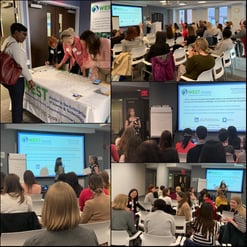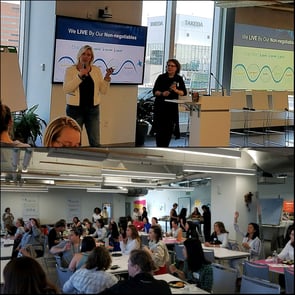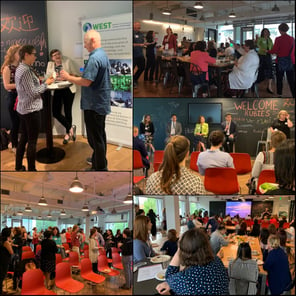Learn more about past events listed below
5/15: Finding your Voice Among all the Chatter
6/12: How to Inspire, Advocate and Grow During Change
6/20: Building Your Company Culture and Developing Your People
5/15: Finding your Voice Among all the Chatter
 On May 15, 2019, Andrea Bordenca treated a WEST audience to her enlightening and entertaining presentation entitled “Finding your Voice Among all the Chatter”. The event was held at Alnylam Pharmaceuticals in Cambridge. Before the keynote presentation, audience members participated in facilitated networking, which provoked lively chatter among the participants and set the tone for an active and engaging evening.
On May 15, 2019, Andrea Bordenca treated a WEST audience to her enlightening and entertaining presentation entitled “Finding your Voice Among all the Chatter”. The event was held at Alnylam Pharmaceuticals in Cambridge. Before the keynote presentation, audience members participated in facilitated networking, which provoked lively chatter among the participants and set the tone for an active and engaging evening.
Andrea told a story about making the transition from a super performer at work into a leadership role and the challenges that accompanied that change. She openly shared her struggles and how they manifested as things like addiction. Andrea explained that when faced with challenges there are actually 4 responses: fight, flight, freeze, but also appease. She made clear that women in particular are very susceptible to feeling like they must respond to insults or criticisms with appeasement.
However when faced with these negative assessments about ourselves, we have a choice. Andrea explained that we can break down these stories into 4 components: domain, standard, assertions, and for the sake of. In regards to domain, you can ask is this their area of concern. Then you can consider whose standards you should be following. Judge the validity of the assertion being made, is it factual. Finally consider if this is something relevant or something you should care about in any way. By breaking down assessments or stories in this manner, you are able to sift through the stories that are put upon us and determine their validity. She stated that it is important to see assessments for what they are, stories, that could be grounded or ungrounded.
Andrea stated that you must go through 300 iterations for something to feel familiar in the body and 3000 iterations for it to be embodied. Therefore it is not surprising that practice exercises were a component of the event. Audience members practiced differentiating assertions or facts from assessments which are stories that are told about you and practiced both offering and receiving assessments.
Learn more about related events at https://generateleadership.com/live-generative-events/
6/12: How to Inspire, Advocate and Grow During Change
 On June 12, 2019, bluebird bio sponsored a program on “How to Inspire, Advocate and Grow During Change." Claudette Rowley, Cultural Brilliance CEO, change management consultant, cultural designer, executive coach, and radio program host kicked off the evening with a workshop. Claudette stated that there are many types of change, they can be unexpected or expected, they can be great or not so great. Claudette then asked audience how they felt about change. The responses ranged from scared, and filled with self-doubt and anxiety to happy. Claudette stated it is important that people remember that change is not always for the worse and that even if you like your current situation, it could change for the better. Claudette then led the audience through a workshop about how to go through the change process and how it is important to turn all changes into opportunities. She stated it is important to recognize that change is transformation and therefore we all need to see change as an opportunity to transform our situations.
On June 12, 2019, bluebird bio sponsored a program on “How to Inspire, Advocate and Grow During Change." Claudette Rowley, Cultural Brilliance CEO, change management consultant, cultural designer, executive coach, and radio program host kicked off the evening with a workshop. Claudette stated that there are many types of change, they can be unexpected or expected, they can be great or not so great. Claudette then asked audience how they felt about change. The responses ranged from scared, and filled with self-doubt and anxiety to happy. Claudette stated it is important that people remember that change is not always for the worse and that even if you like your current situation, it could change for the better. Claudette then led the audience through a workshop about how to go through the change process and how it is important to turn all changes into opportunities. She stated it is important to recognize that change is transformation and therefore we all need to see change as an opportunity to transform our situations.
Claudette then explained 3 components of the Cultural Brilliance Change System: assess, design, and interrogate. Assessing is about examining both the internal response and external reality. Claudette stated that it is your gut feeling or intuition that makes up your internal response and that it is important to honor your feelings. The external reality consists of facts and data which are the components of the landscape of the situation. Design refers to identifying your vision of success (or goal) for this change. This is about determining how you would define your successful transformation. Integrate is about designing your strategy and then determining how to develop and implement your plan. Claudette reminded the audience that although this process was simple that does not mean it would always be easy. The audience then worked in small groups to practice this process and there was a discussion about learnings after each step.
After learning about this impactful technique, Claudette raffled off 5 copies of her Amazon bestselling book “Cultural Brilliance: The DNA of Organizational Excellence”.
After the workshop there was a panel discussion led by WEST board member Mary Ann O’Loughlin. The panel consisted of Mercedes Lobera (Senior Director, Genomic Immunology at GlaxoSmithKline), Jennifer Cashton (Chief of Staff and Heads of Operations of the Gastrointestinal Therapeutic Unit at Takeda Pharmaceuticals), Sarah Sheikh (lead for neuroscience translation and early clinical development efforts at Celgene) Suzi Melotti (Associate Director, CMC Early Oncology, bluebird bio), and Andrea Itano (Senior Vice president, Head of Immuno-Inflammatory diseases, Evelo). The panel members shared their thoughts about change and were asked to speak about their experiences with having change imposed on them during their careers and how they reacted to it emotionally at the time and how do they feel about it now. After the panel, everyone was invited to stay and network.
6/20: Building Your Company Culture and Developing Your People

A healthy company culture and good development of personnel are important for keeping employees happy, and to stop a company’s best people from leaving for greener pastures, especially in fields where there is a shortage of qualified individuals. On June 20th, four corporate culture experts sat on a WEST panel moderated by Jo Viney of Pandion Therapeutics to discuss best practices in this area. Chesley M. Chen of gRoot Biomedical and Air Systems Technologies, Erin Deemer of Brimstone Consulting, Theo Proukou of Rubius Therapeutics, and Carol Yamartino of The Yamartino Group LLC, weighed in on how a company’s leadership can build a good company culture and, as an individual, how to assess the culture of a potential workplace.
From a company’s perspective, our panel agreed, a good culture can occur naturally when a company is very small, but must be nourished and, even, explicitly established as a company grows. Aspirational mission statements can bring team cohesion and drive employee performance. This is not to say that it should be decided entirely by the upper echelons of leadership; rather, the panel noted that employees often feel more invested in a company’s ethos if they play a part in creating it. Once a culture has been established, it is important to uphold that standard, recognizing individuals who embody those values, building the values into the reward structure of the company, and, importantly, not shying away from addressing problems as they arise.
As an individual, the panel stressed that you can learn a lot about company culture, even during the short span of an interview, by treating your interactions as an anthropological study. How is the space decorated? How do team members interact with one another? Do they seem happy and treat each other well, or are there obvious tensions? How does the company talk about itself? A healthy company culture not only addresses successes, but, critically, company low points as well. Look for a company whose culture works for you. Not everyone enjoys the same workplace environment, and even an excellent company can be a bad fit for an individual, however well qualified.
The panel concluded that what makes a healthy company culture can vary between companies, while bad company cultures share similarities. A good company culture allows for individuals to interpret the mission in their own unique way, strengthening the company with their strengths. Bad company cultures frustrate employees and management alike, and can cause good people to leave bad companies.
Summaries written by Leah Cole and Anne Weeks.


